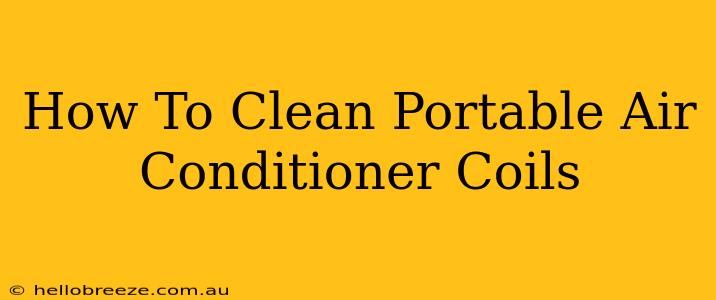Keeping your portable air conditioner running efficiently is crucial, especially during those sweltering summer months. A key component to its performance is the cleanliness of its coils. Dirty coils restrict airflow, reducing cooling power and potentially damaging your unit. This guide provides a comprehensive, step-by-step process for cleaning your portable AC coils, ensuring optimal performance and longevity.
Understanding the Importance of Clean Coils
Before diving into the cleaning process, let's understand why coil cleaning is so important. Your portable air conditioner's coils are responsible for exchanging heat. Dust, dirt, pet dander, and other debris accumulate on these coils, acting as an insulator and preventing efficient heat transfer. This leads to:
- Reduced Cooling Capacity: A dirty coil struggles to absorb heat, resulting in a less effective cooling performance. Your unit will work harder, consuming more energy and potentially failing prematurely.
- Increased Energy Consumption: The unit has to work overtime to compensate for the restricted airflow, leading to higher electricity bills.
- Shorter Lifespan: The strain on the compressor and other components from inefficient operation significantly reduces the lifespan of your air conditioner.
- Potential for Frozen Coils: In extreme cases, restricted airflow can cause the coils to freeze, leading to serious damage.
Tools and Materials You'll Need
Before you begin, gather these essential materials:
- A soft brush: A brush with soft bristles is ideal for gently removing loose debris. Avoid stiff brushes that could damage the delicate fins.
- Vacuum cleaner with a brush attachment: This will help remove the loosened dirt and debris effectively.
- Coil cleaning solution: You can purchase a specialized coil cleaner from most home improvement stores. Alternatively, a mild solution of dish soap and water can work well. Never use harsh chemicals or abrasive cleaners.
- Spray bottle: To apply the cleaning solution evenly.
- Old towels or rags: For wiping and drying the coils.
- Gloves: Protect your hands from dirt and cleaning solution.
- Safety Glasses: Protecting your eyes from debris is crucial.
Step-by-Step Cleaning Process
1. Power Down and Disconnect: This is the most crucial step. Always unplug your portable air conditioner from the power outlet before starting any cleaning process. Safety first!
2. Access the Coils: Refer to your air conditioner's manual to locate the coils. Most portable AC units have easily accessible coils, often located at the back or on the sides of the unit.
3. Remove Loose Debris: Use the soft brush to gently brush away any loose dirt, dust, and debris from the coils. Work carefully to avoid bending the delicate fins.
4. Vacuum the Coils: Once you've removed the loose debris, use the vacuum cleaner with the brush attachment to thoroughly clean the coils. Pay close attention to the spaces between the fins.
5. Apply Cleaning Solution (Optional): If using a coil cleaning solution, lightly spray the coils with the solution, ensuring even coverage. Avoid over-saturating the coils. Allow the solution to sit for a few minutes to loosen any stubborn dirt.
6. Rinse (If Using Cleaning Solution): If you've used a cleaning solution, carefully rinse the coils with clean water. Use a spray bottle to avoid excessive water.
7. Dry the Coils: Use old towels or rags to thoroughly dry the coils. Ensure all moisture is removed to prevent rust or damage. You can also allow the coils to air dry completely.
8. Reassemble: Once the coils are completely dry, reassemble your portable air conditioner and plug it back in.
Maintaining Clean Coils: Prevention is Key
Regular cleaning is key to preventing buildup and maintaining peak performance. Aim to clean your portable air conditioner coils at least twice a year, or more frequently if you live in a dusty environment or have pets.
By following these simple steps, you can keep your portable air conditioner running smoothly and efficiently, enjoying cool comfort throughout the summer. Remember, preventative maintenance is cheaper and far less stressful than emergency repairs!

